AHEAD OF TIME! Navy's overshadowed contribution in Liberation war
Due to its desperately covetous interest in the IOR, China misjudged the prevailing condition in 1971 as a golden opportunity to enter the geo politics of the region and stood by West Pakistan in the war
Total Views |
“Whoever controls the Indian Ocean will dominate Asia…..In the twenty-first century, the destiny of the world would be decided on its water”
- Alfred Thayer Mahan, 1890
India succesfully completed the celebrations of Swarnim Vijay Varsh in 2021, which was the commemoration of the victory in the 1971 India - Pakistan war. Indian Navy celebrated National Navy Day on Dec 4, in commemoration of the success of Operation Trident that was followed by Operation Python. Interestingly, both the naval operations have played a decisive role for the Indian victory in the 1971 war with Pakistan and the liberation of Bangladesh. Primarily accessing the war on multiple parameters, there are several aspects to the war that explain how the geo politics of South East Asia changed completely in the post war scenario.
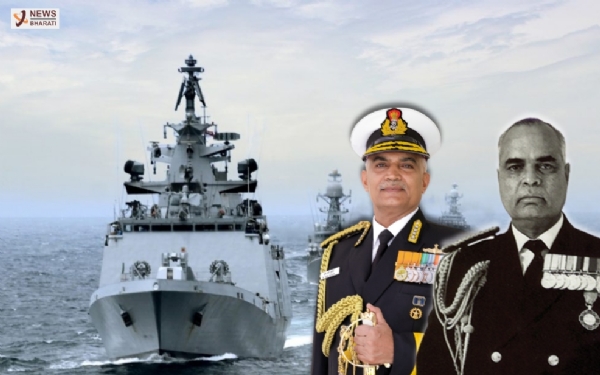
The war, particularly the naval aspect of the war, had larger implications than just affecting the two nations involved; India and Pakistan, and the newly born Bangladesh. The naval victory of India in the war, especially, secured India's position in the region as a strong maritime power. The war itself, seemed significant from a global perspective, which is why countries not directly affected by the war too were trying to be a part of it, by providing arms-ammunitions and assistance on similar grounds, only to secure their interests in the region, in future. Clearly the war was not limited to the Bay of Bengal and the Arabian Sea. Indirectly, it directed the turn of events in the entire Indian Ocean Region (IOR) that were to take place in the near future.
Putting a check on the hegemonistic Chinese dragon
Today, India stands to be the only regional power in the Indian Ocean Region that is capable of putting a check on the hegemonistic Chinese dragon. The Chinese aggression faces utmost resistance from India, in armed as well as diplomatic means. The Indian tri services are building constant pressure on China. But what is it that is making India go beyond its usual extents to secure the sovereignty of not only Indian waters but international waters as well?
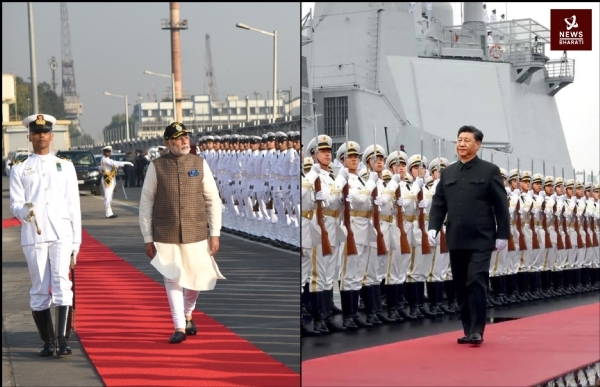
Of course, it is the Chinese rapacity to gain control of more and more resources and never being fulfilled. China's aggression today comes out of the coats where it had been hiding behind for all these years and yet existed, slowly, stealthily, making its way out. Rather, it was evident for all these years but now that the picture is visibly taking shape, China's efforts to grab lands seems more impactful. The fact cannot be denied that over the years China's strategies to create dominance in the world have only kept on advancing. On the contrary, Chinese President Xi Jinping never conserves uniformity in his words and actions and diplomatically attempts to portray a fair picture of China's foreign policy on international platforms. On the occasion of the completion of 50 years of People's Republic of China's restoration of lawful seat in the United Nations (UN) in Oct 2021, Xi Jinping stated;
"No country has the right to dominate global affairs, control the destiny of others, or keep advantages in development all to itself."
Interestingly, the occasion was important not only for China, but it was for Pakistan as well, since the Islamic country takes complete credit for the inclusion of China in the United Nations on Oct 25, 1971. Pakistan provided crucial support in China’s membership of the UN as Pakistan's President Gen Yahya Khan helped the US establish relations with China in 1970 that resulted in US National Security Adviser, Henry Kissinger's visit to China. The visit was followed with the inclusion of China in the UN, which happened just prior to the Indo - Pak War.
Sino - Pak relations during the war
With India's strong resistance against China's aggressive expansionism, that is highly dependent on the debt traps the country has set in the form of loans and developmental projects, for almost all the countries in the IOR, the struggle between India and China to establish regional dominance remains at peak today. However, the existing geo-political conditions were easily perceptible to China ever since the 1960's and have seem to have reflected in the 1971 war. China perceiving India as a potential threat to its smooth access to the IOR explains why China promised assistance and support to Pakistan at those times.
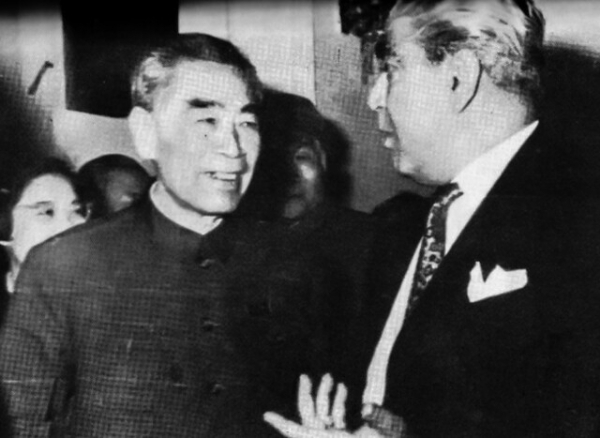
China had developed extensive relations with Pakistan in the 1960's, at the same time, when Indo-China relations were already at stress. The Sino-Pakistan Agreement of 1963, when Pakistan unlawfully surrendered a part of Indian land which they claimed to have control of, to China, is a renowned incident of the absurdity that was rooted in the relations being extended between Indian neighbors, from west to that in the east. However, the picture explains it well, how all that China was looking for was an alternative route to the Indian Ocean for the existing route through the chicken neck of Malacca Strait, where the Indian navy has always been in a dominating position. In case any act of aggression occurs from the Chinese side, India always had a veto against China in the maritime domain. Due to its desperately covetous interest in the IOR, China misjudged the prevailing condition in 1971 as a golden opportunity to enter the geo politics of the region and stood by West Pakistan in the war against East Pakistan and India.
Armed Coalition against India
There is enough evidence suggesting how China had been thoroughly involved with Pakistan to prepare for the 1971 war. 'Pakistaniaat: A Journal of Pakistan Studies Vol. 2, No. 3 (2010)' addresses several statements mentioned in the letter sent at that time from the Chinese Premier Chou En Lai to Pakistani President General Yahya Khan. In the letter Premier Chou lastly assured China’s support to Pakistan in the event stating that the “State and sovereignty and national independence” of Pakistan was threatened by the aggression of the Indian expansionists. China proclaimed support for the Government of Pakistan by December. Besides, on May 11, 1971, Jin Men Jih Pao, through an editorial in the People's Daily, condemned “Washington and Moscow for working in close coordination with the Indian reactionaries to crudely interfere in the internal affairs of Pakistan.”
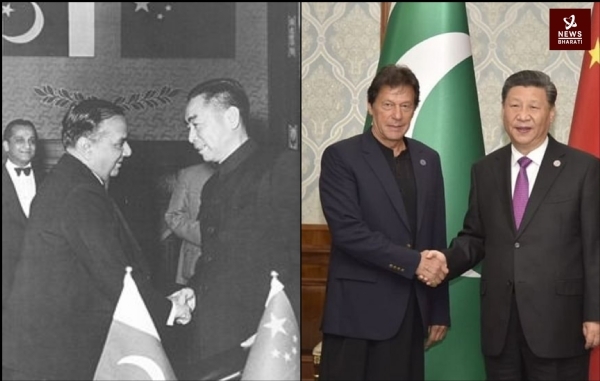
Apart from several Indian claims of the Chinese assistance to Pakistan during the war, 'Pakistaniaat' too mentions that according to the US observer in Pakistan, during the five year period from 1961 to 1966, Beijing contributed over $130 million worth of military equipment and supplies. According to the reports published in the Pakistani daily 'Dawn', on Nov 25, 1971, "A Pakistani spokesman had revealed that the PRC had dispatched 200 military instructors to Pakistan for the purpose of training of Pakistani troops for guerilla warfare.” Indian army veteran Maj Gen D K Palit has mentioned in his book 'The Lightning Storm' that in 1971-72 the free Chinese arms assistance to Pakistan has been estimated of consisting 225 T-59 tanks, one squadron of II-28 bombers, and four squadrons of MIG-19 interceptors, along with “an unspecified number of river boats and coasters and Chinese assistance in the construction of two major ordinance factories.”
The data is clearly suggestive of how the 1971 war was not an outcome of Indian aggression as they term it, but a continuous and planned effort. At the same time, the sources also suggest how the war was fought indirectly by China as well, where Pakistan was merely responsible for the acts on field and China seemed to have been involved in the forethought of the war. The support China provided to Pakistan at the UN too, adds significant value to the hypothesis of the Chinese nexus of 1971 war.
India copes with String of Pearls Strategy
Today when we look at the entire series of events in continuity, we realize that the bigger picture behind the Indian victory in the 1971 war was actually the establishment of India in the IOR as a strong naval power in the post - independence period. For China, the partnership with Pakistan had always been about a secured access into the IOR.
India is the only regional country in the IOR that is strictly resistant to Chinese expansionism and is not falling for the Chinese String of Pearls policy. The littorals in the region, thus, look up to India for a secured maritime environment against threats possessed by China. The Indian Ocean Region is rich in resources and around 40% of world's petroleum reserves are stored in the IOR, which attracts the entire world. However, China is the only nation in the world which aims to establish its ownership in the region and depends on the String of Pearls strategy to succeed in it.
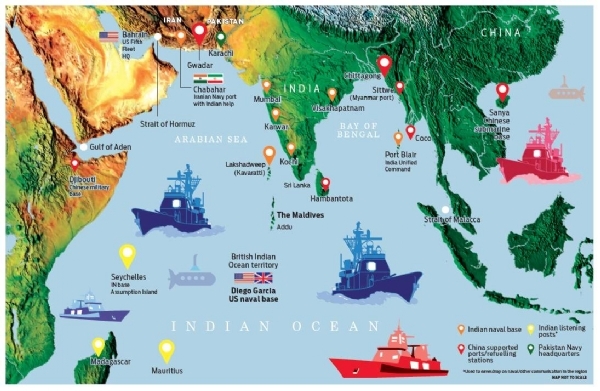
It is believed that through the String of Pearls strategy, China intends to establish a network in India Ocean Region (IOR), surrounding India in a string like formation, where each pearl represents some sort of permanent Chinese military installation in a series of locations. The Chinese invested ports such as Gwadar, Hambantota, Sittwe are all commercial ports and there are speculations that China could easily convert them into Naval facilities. Considering China's reputation, the speculations are potential threats to each and every nation in the IOR. India, therefore, has made scrutinizing movements accordingly. India has modernized facilities in the Andaman Islands and at a base in Campbell Bay in the Nicobar Islands.
With infrastructure development plan worth Rs 56.5 billion aimed at allowing additional warships, aircraft, troops, and drones to be stationed in the Andaman and Nicobar Islands that was finalized in 2019, the Indian Navy also commissioned the naval station INS Kohassa in the islands.
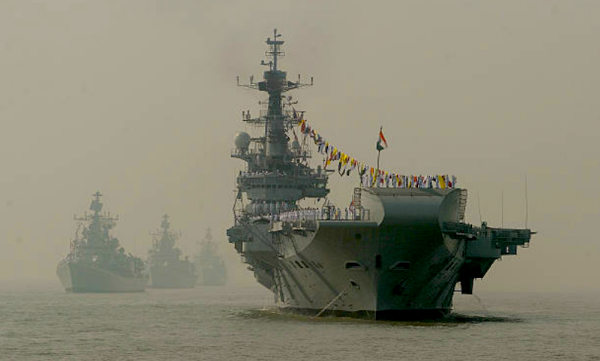
Talking about Mauritius, in reference to the MoU signed between PM Narendra Modi and his Mauritian counterpart in 2015, India has promised to set up infrastructure for improving air and sea connectivity and is working accordingly. The development project represents Mauritius's largest source of foreign direct investment (FDI) and has been welcomed by the Agaléga Islanders from Mauritius. In case of Seychelles, India has helped with ocean mapping to protect Seychelles Exclusive Economic Zone and has donated aircraft and launched a radar project.
Undoubtedly, the role of the Indian navy is extremely crucial in the IOR and thus, eventually, makes difference in global geo politics. India’s constructive leadership to provide immunity to the Indian Ocean Littorals lays the foundation of a comprehensive developmental environment that is necessary in the IOR.
Today, Indian Navy's position in the Indian Ocean Region (IOR) is strategic for India's national security, India's 'Neighbourhood first' policy and more importantly to counter China. The basis of this was installed during the initial Operations Trident and Python, which favored the 1971 war on Indian side. This important aspect of the 1971 war and the subtle role of Indian Navy in Indian victory in the war has remained veiled for years.
---


